| Srl | Item |
| 1 |
ID:
094516
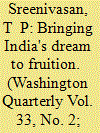

|
|
|
| 2 |
ID:
100991
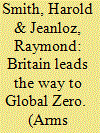

|
|
|
|
|
| Publication |
2010.
|
| Summary/Abstract |
The United Kingdom, not the United States or Russia, is leading the way along a path to a possible world without nuclear weapons. The British not only are reducing the number of nuclear weapons, but in so doing are making an implicit statement, through the resultant force posture, about the kind of deterrence that nuclear weapons provide. Can and should the superpowers follow the same path?
|
|
|
|
|
|
|
|
|
|
|
|
|
|
|
|
| 3 |
ID:
100624
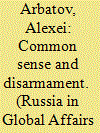

|
|
|
| 4 |
ID:
130482
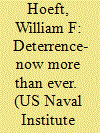

|
|
|
| 5 |
ID:
130270
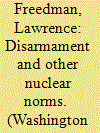

|
|
|
|
|
| Publication |
2013.
|
| Summary/Abstract |
Once the Cold War ended, and with it the prospect of a cataclysmic Third World War, many argued that the nuclear arsenals accumulated during its 45 years were anachronistic and redundant. By the mid-1990s, calls for their complete elimination had gained notable adherents.1 Yet, while elements of these arsenals were removed without much difficulty, their size and destructive power remained substantial and the disarmament movement soon flagged. It took about a decade for it to revive, when in 2007 a surprising group of senior American statesmen refreshed the process.2 Organizations such as Global Zero, which has attracted high-profile support,3 and various international commissions4 echoed their call for a world free of nuclear weapons. This issue impressed itself sufficiently on Barack Obama that he made it the subject of one of his first speeches as President, when he spoke in Prague in April 2009 and committed the United States to the goal of complete nuclear disarmament.
|
|
|
|
|
|
|
|
|
|
|
|
|
|
|
|
| 6 |
ID:
123123
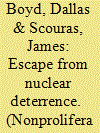

|
|
|
|
|
| Publication |
2013.
|
| Summary/Abstract |
Since the post-World War II genesis of nuclear deterrence, two presidential initiatives have been presented to deliver humanity from the threat of its failure. The first was the Strategic Defense Initiative (SDI), a constellation of space- and ground-based systems that President Ronald Reagan envisioned would render nuclear weapons "impotent and obsolete." The second is President Barack Obama's roadmap to "a world without nuclear weapons," commonly referred to as "Global Zero." While these proposals appear to have little in common, deeper investigation reveals a number of provocative similarities in motivation and presentation. Moreover, both generated fierce debate, often with ideological overtones, about their strategic desirability and technical feasibility. We use these parallels, as well as prominent dissimilarities, to draw lessons from the SDI experience that can be applied to the debate over Global Zero.
|
|
|
|
|
|
|
|
|
|
|
|
|
|
|
|
| 7 |
ID:
118123
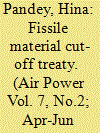

|
|
|
| 8 |
ID:
115787
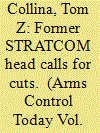

|
|
|
| 9 |
ID:
094515
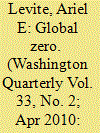

|
|
|
| 10 |
ID:
105208
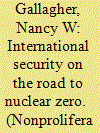

|
|
|
| 11 |
ID:
094116
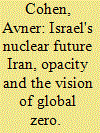

|
|
|
| 12 |
ID:
100565
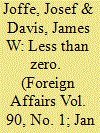

|
|
|
|
|
| Publication |
2011.
|
| Summary/Abstract |
All previous attempts at total nuclear disarmament have failed, as strategic logic and state interest have prevailed over wishful thinking. A similar fate awaits Global Zero, the newest disarmament movement, for similar reasons.
|
|
|
|
|
|
|
|
|
|
|
|
|
|
|
|
| 13 |
ID:
133990
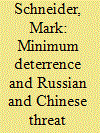

|
|
|
|
|
| Publication |
2014.
|
| Summary/Abstract |
Minimum Deterrence advocates, such as the Global ZERO report chaired by retired General James Cartwright, often urge the elimination of the U.S. triad of ICBMs, SLBMs, and bombers and minimum modernization of U.S. nuclear forces. These recommendations ignore fundamental realities. Both Russia and China have announced that they intend to increase their nuclear forces and both are modernizing their forces. Russia and China regard the U.S. as their main enemy and are arming against us. The Minimum Deterrence assumption that there is no risk of a conflict between the U.S. and Russia or China is a dangerous one. Both Russia and China have significant territorial claims against their neighbors. Russian claims to the Arctic Ocean and Chinese claims over the South China Sea are particularly troubling. China continues to threaten war over Taiwan. China has increasingly used military might to support its territorial claims in the South China Sea, creating incidents that have the potential to escalate into war. The most fundamental problem with Minimum Deterrence is that it intentionally degrades our deterrence of nuclear or other WMD attack, as well as our ability to deter nuclear escalation in a situation where the U.S. provides allies a credible nuclear umbrella. U.S. failure to provide a credible nuclear umbrella could result in Japan and, possibly other nations, deciding to go nuclear in order to protect themselves.
|
|
|
|
|
|
|
|
|
|
|
|
|
|
|
|
| 14 |
ID:
106839
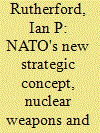

|
|
|
| 15 |
ID:
145893
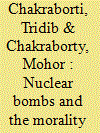

|
|
|
|
|
| Summary/Abstract |
The atomic bombing of Hiroshima and Nagasaki, led by the US in August 1945, remains the most brutal insignia of the Second World War. Seventy-one years after this incident, the recent visit of the US President, Barack Obama to the Hiroshima War Memorial has resurrected several issues related to the apocalyptic bombings, foremost among which is the question of a pending apology by the perpetrators of this ‘crime against humanity’. The devastating consequences of the use of nuclear weapons in war cannot be justified on moral grounds, in keeping with which, the International People’s Tribunal (2007) has declared the twin bombings as both a ‘war crime’ and a ‘crime against humanity’. Although President Obama espouses a world free of nuclear weapons, their complete elimination seems too far-fetched and utopian, at least in the short-term. Fortunately, the existence of mechanisms to prevent non-proliferation could contribute towards checking the increase in nuclear stockpiles and facilitate steps towards greater international peace and security.
|
|
|
|
|
|
|
|
|
|
|
|
|
|
|
|
| 16 |
ID:
119125
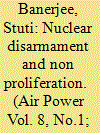

|
|
|
| 17 |
ID:
144295
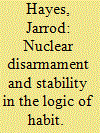

|
|
|
|
|
| Summary/Abstract |
In 2008, the announcement of the Global Zero campaign—an international effort to eliminate nuclear weapons—coincided with the election of Barack Obama. The new president, avowedly pro-disarmament, made getting to zero nuclear weapons a centerpiece of his foreign policy. This article takes on the question of what impact global disarmament might have on international strategic stability. In a break with much of the literature and analysis on nuclear policy, it explicitly focuses on how publics understand the significance of nuclear weapons. In so doing, the article draws on recent international relations scholarship on the role of habit to argue that eliminating nuclear weapons can generate instability by creating widespread perceptions of insecurity and anxiety. If disarmament campaigners wish to achieve their goal without generating instability, they will need to work over the long-term to break habituated beliefs about nuclear weapons.
|
|
|
|
|
|
|
|
|
|
|
|
|
|
|
|
| 18 |
ID:
117862
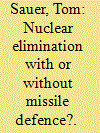

|
|
|
|
|
| Publication |
2012.
|
| Summary/Abstract |
The idea of nuclear elimination is becoming more popular. At the same time, missile defence is being built. The aim of this article is to link the two phenomena: does Global Zero require effective missile defence, or will missile defence hamper the road towards nuclear elimination? First, I will examine how proponents of the recent move towards nuclear elimination regard missile defence: are they in favour or against? This descriptive portion of the article is followed by a personal evaluation based on the literature. Assuming that nuclear elimination becomes a priority in order to win the fight against nuclear proliferation and nuclear terrorism, and assuming that missile defence will not become reliable under real circumstances, then the best option seems to be zero offensive and zero defensive ballistic missiles. Second best would be to limit the existing missile defence capabilities to theatre missile defence, excluding those theatre missile defence systems (like advanced SM-3 missiles on Aegis ships) that can easily be plugged together to form a strategic missile defence capability.
|
|
|
|
|
|
|
|
|
|
|
|
|
|
|
|
| 19 |
ID:
120545
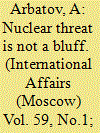

|
|
|
|
|
| Publication |
2013.
|
| Summary/Abstract |
Armen Oganesyan, Editor-in-Chief of International Affairs: What are, from your point of view, the major developments in the area of international security for the recent period?
A. Arbatov: Security issues are beginning to concern the common people only when a war breaks out or the military spending increases to the point where they feel it in their pockets. In the past year, relations between the U.S. and Russia have deteriorated, as have those between Islamic states, Iran on the one hand and Arab states on the other. They are fighting with Syria by proxy. But that is just the first portent of a direct military confrontation. Take China and Japan: with what intensity the island territorial dispute has erupted! Or South East Asia: the exacerbation of tension between China and countries such as Vietnam, Malaysia and the Philippines over disputed islands in the South China Sea. I'm not even talking about Africa. You permanently see flashes of civil wars with interventions there.
|
|
|
|
|
|
|
|
|
|
|
|
|
|
|
|
| 20 |
ID:
127462
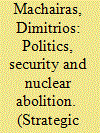

|
|
|
|
|
| Publication |
2014.
|
| Summary/Abstract |
Disarmament and non-proliferation are rightfully viewed as two sides of the same coin: the two imperatives that need to be met if the prospect of the complete elimination of nuclear weapons is to be realised. Although the existence of a link between the two concepts is obvious, the exact nature of this connection is perhaps not as clear. The central question here is whether it is politics or strategic realities that shape states' nuclear options and by implication, the two-fold road to global zero. Its answer is of great importance, indicating which tools and policies can be most appropriate for achieving this goal. This commentary employs logical/theoretical as well as factual analysis in order to show that the link between disarmament and non-proliferation is conditioned primarily by strategic realities rather than politics.
|
|
|
|
|
|
|
|
|
|
|
|
|
|
|
|